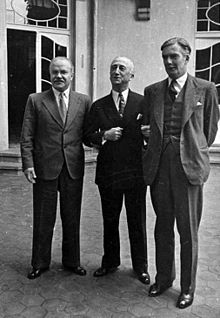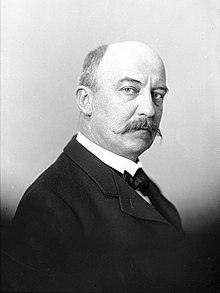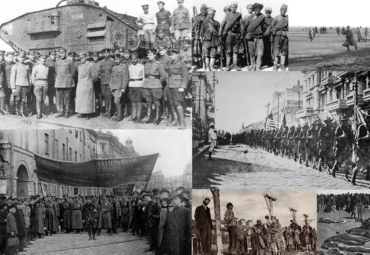User:MadameEphrais/sandbox
The Commonwealth Wars (Polish: Wojny Rzeczypospolitej; 8 December 1932 — 17 May 1937)[note 1] also referred by contemporaries as the War on the Vistula was a multi-party civil war in the former Polish-Lithuanian Commonwealth sparked by the rising tide of Nationalist movements in Ukraine, Latvia, Lithuania, and others, Republican opposition to the Monarchy, and the failure of the moderate government to maintain stability following the Depression of 1924 and the dissolution of their domestic institutions following the assassination of King Karol I, whose death culminated in the beginning of the civil war. The finale of the war culminated in the end of monarchical rule in Poland, tensions between Austria and the new Polish state, and cementing Russia's dominance in Eastern Europe permanently.
The mid to late 1880's marked a drastic decline for the monarchy, as the Commonwealth struggled to keep afloat amidst the growing tides of nationalist movements in the eastern parts of the country, alongside the desire for reform which was sidelined during the reign of Karol II, with the country being led into managed decline by Karol III. With the elective monarchy, on which the Commonwealth was established, practically controlled and dominated only by the Habsburg dynasty, the political flux of the country left many of the citizens leaning towards both political extremes and the nascent Republican movement which gained popularity around the beginning of 1900.
In 1932, with the assassination of King Karol and subsequent turbulent regency of his son, Karol IV, sparked nation-wide protests and riots, which culminated in the storming of the Sejm in Warsaw, that was followed by the renowned "Tide of People's" speech spoken by Ignacy Daszyński, held in the Polish Sejm, which ushered first in the history of Poland, a Republic. The Habsburg loyalists fled south to the city of Kraków, and took up the banner of Kingdom of Poland and Lithuania, consolidating territory around the southern portion of the country, against the Provisional Council, which controlled most of the north. With the escalation of the war prompted further national secession on the Polish pogranicze, causing the secession of Ukraine and the creation of a socialist republic soon thereafter, the retreat of the loyalists leaving Belarus free to proclaim a sovereign republic, and a civil war followed between the Poniatowskis and their loyalists and a nascent republic in Lithuania that was inspired by the Sejm's "December Proclamation", and the General Jewish Labour Bund which would establish a revolutionary commune in the city of Wilno, which served as the cultural capital of Eastern Europe during the late nineteenth century.
By 1934, the Commonwealth had bled itself dry and the devastation of the region led to one of the most disastrous humanitarian crises in the region, followed by famine and refugee crossings between East Prussia and the Gdansk area, all the more whilst the political scales of Karol IV's government shifted further right, leading to the institution of a nationalist, military dictatorship spearheaded by Edward Rydz-Śmigły, Roman Dmowski, and former foreign-minister Józef Beck, that gradually sidelined Karol's ability to dictate political decisions to his government, with a series of gruesome persecutions and pogroms known as the White Terror, whilst the Republic gradually encroached on the Kingdom their advances would be heavily hampered by the reinforcements provided by the Emperor of Austria, Franz II. Though initially holding a tepid line of passive support towards the monarchy, it become evident to the Russian Empire that the Loyalists were standing on their last legs and prepared for a forceful entry into the war, whilst France and Germany held divisive views on the resolution of the conflict with British Commonwealth's vocal support of the Republicans.
As a last ditch effort to not prolong the suffering caused by the war, the President of the Swedish Republic, Axel Rubbestad, convened a diplomatic conference in the capital city of Stockholm and calling for a resolution to the conflict, with all the major European empires partaking in the summit. Though successful in brokering a temporary truce between both the Loyalists and Republicans, and allowing for the Republic to focus on the Black Brigadiers which were terrorizing the Ostpreußen corridor, the war would drag on for another year before it could come to a close. In the time of brief peace that both sides were given, a military plan was developed by Marshal Józef Piłsudski and General Józef Olszyna-Wilczyński, that would lead a forceful mechanized assault towards Gleiwitz, cutting the Loyalist forces into two and disconnecting them from vital communication lines, and though bloody, it achieved all of its tactical goals and the capture of Kraków, which would formally end the war, with continued resistance from nationalist militias, and the Russian annexation of the pogranicze nations, such as Ukraine and Belarus, and the defeat of the monarchy in Lithuania, marking an end to three-hundered-sixty-eight years of monarchical rule in both countries.
Background[edit]
The underlying causes of the decline of the Commonwealth lay with the failed partitions raised by the Kingdom of Prussia, and in Russia, due to the active political interference of the Habsburgs of Austria in keeping the polity afloat, with the succession of Habsburg kings being largely uncontested prior to the Napoleonic Wars. Despite the initial popularity of the Habsburg monarchs, such as that of Charles of Teschen who was awarded the kingdom by his older brother, Francis II, who was given the title of "The Soldier King" for his outstanding performance against Napoleon's Continental Army. Charles embraced the Polish language and customs, crowning himself as Karol I, first in the history of an independent Poland, and through his patronage of the arts, construction of several palaces in the Gothic Revival style in Krakow and Warsaw, alongside the city of Wilno gaining royal favour, it became one of the most prominent centers of culture of not only in Eastern Europe, but in all of Europe in general. His reign would follow as one of the most successful chapters of the Habsburg monarchy in Eastern Europe. The late 1880's, however, painted a grim picture of the Commonwealth, as the reluctance of the Kings following the death of Charles to reform led to stagnation of the Sejm, the Royal Polish parliament reestablished by Charles, and the decentralization amongst the Governorates of the Commonwealth, as result of corruption in the institution and the growing discontent against the ever foreign monarchy, it would only worsen. Combined with rising political extremism, increased ethnic tensions and Republican discontentment emerging within the Inteligencja, it resulted in a dilemma that the Commonwealth could struggle to contain.
Hastened by events such as the death of the acclaimed writer Ivan Franko within Pawiak prison, the ramping up of violent state crackdowns within the Eastern pogranicze (borderlands), the events of the Polish Downturn - the economic depression posed an even greater threat to the stability of the Commonwealth. Traditional histories, such as those by Dąbrowski and Rozstworowski, portray the economic disaster as secondary to the political elements within the country. However, historians such as Matorski and Ponichtera, depict the crisis as the "tipping point", where the state inevitably doomed itself to collapse, as the Commonwealth failed to pay back its multitude of loans. What investment that was made into recovery - named "Plan A" - was skewed to the "core" Polish and Lithuanian ethnicities within the country, with minorities accusing the government of ignoring their conditions.
The Death of King Karol[edit]
On October 18th, 1932, King Karol III was assassinated by Hryhorij Maciejko, a radical Ukrainian nationalist. While inspecting the inauguration of the SJKM Kijów, at the Stocznia Gdańska, Maciejko carried a small package within a handkerchief. Inside the handkerchief, the assassin had smuggled a German stielhandgranate. As he later recalled, under interrogation by the State Police:

There was no hesitation on my part. I saw him looking at the (pauses) bow of the ship. His entourage was surrounding him, and I knew if I aimed the explosive correctly, it would land in the middle of the crowd. I pulled the cord and threw it at them. He (referring to Charles) did not see it, until it had already detonated. I looked away, because the heat almost burnt me so badly. When I looked back, I saw him lying on the ground. His legs were shattered, and I could see his grey bones sticking out his thigh. Everything else was too covered with blood and epaulettes to see properly. I must think he died instantly, for he did not even scream. But one can hope.
The assassination took place at 13:32. Hryhorij was immediately arrested by police who had heard the explosion, being personally subdued by Jan Tomasz Jur-Gorzechowski - head of the Commonwealth Border Guard who had stayed behind from the crowd to receive a phone call from his wife. According to eyewitness testimony, Karols' last words were:
If we had more weapons like this, we would be invincible.
Karol was carried back to the Royal Castle in Warsaw, where he was tended to by the Royal Physician Eugene Lazowski. Lazowski almost immediately reported that the injuries were most likely fatal. Karols' right leg was torn away from the medial epicondyle downwards, while his left femur had snapped in half, jutting out of the thigh. Bleeding to death, his face mutilated by shrapnel and a weakening pulse rate, he was given Communion and Last Rites. At 15:17, Karol the I of the Hapsburg-Lothringen Dynasty passed away and his personal standard was lowered sixteen minutes later.
On October 30th, twelve days later, Karol Olbracht of Małopolska, son of the King, was formally proclaimed as Regent-Protector of the Polish-Lithuanian Commonwealth. The Regent-Protector enacted with the full, unanimous support of the Regencja the Emergency Act, which would dissolve the Sejm, and indefinitely postpone the election for the next King of the Commonwealth. Though Karol promised to rule fairly, the Commonwealth was rocked by the assassination of King Karol, and the dissolution of the parliament and the suspension of the election spread disquietitudes through the nation. Making matters worse, the Regent-Protector failed to tackle the ongoing economic crisis that had plagued the Commonwealth for years, with a record 17.3% unemployment rate being recorded in August 1932.
The Proclamation of the Republic[edit]
On the evening of December 2nd, units of the 1st Polish Armoured Division surrounded the Sejm Parliamentary Building, led by Colonel Stanisław Maczek. Calling for the "end of incompetent royal rule", Maczek put the Parliamentary Building under siege for three days. Following intermittent scuffles with the lightly equipped Urzędnicy Ochrony Fizycznej - Parliamentary Security Guard - and the paralysis of the military hierarchy within Poland as a response, Maczek's units stormed the barricades and the Sejm on December 5th. With most UOF officers fleeing or being executed, the 1st Polish Armoured Division easily seized control.
Once in control over the building, Maczek invited Stanisław Mikołajczyk to give a live televised speech on December 6th. Retroactively named 'The December Proclamation", the Proklamacja Republiki (Proclamation of the Republic) declared that the Regency was null and void, due to "gross incompetency". In its place, the four-century long monarchy was to be abolished and a new "free Polish Republic' was to take power. Within the speech, Mikołajczyk declared that all good Polish citizens should overthrow their local government and establish a new, democratic state. Meanwhile, the remaining Monarchist elements within the country, escaping the complete takeover of Warsaw, regathered in Krakow. Becoming the capital for the rest of the Civil War, Czuma denounced the "Decembrists" as traitors to the Crown and issued a countermand on December 6th to face down the traitors and eliminate all resistance. With this infamous countermand, the start of the Second Deluge had begun.
The Fall of the Commonwealth[edit]
Much to the chagrin of the Monarch, the Republicans were not alone in their perceived treason against the Crown. The peoples of the neglected eastern pogranicze declared their independence from the Commonwealth. On December 17th, Kost Levytsky - in an emergency gathering of like-minded separatists inside the newly-baptised 'Ukrainian National Rada' - declared the unilateral secession of the West Ukrainian People's Republic from the Commonwealth. During the course of December 18th - known by Ukrainians as the "Day of Reaping" - the Kijów Polish Garrison was surrounded in their barracks by paramilitary Citizens' Militia units. Following a standoff, the garrison surrendered. While they had been promised safe passage, their leadership was taken to Lukyanivska Prison and executed for "crimes against the Ukrainian people", referring to the Red Harvest, where the garrison had been involved in the violent crackdown against protesting crowds within Kodaky (modern day Dnipro), resulting in the deaths of 205 civilians.
Though nominally loyal, the Kingdom of Lithuania has felt marginalized by the Habsburg government in the Polish heartlands, a trend of growing dissatisfaction sown by the Poniatowski family who had been in power since their christening by Catherine the Great as eligible heirs to the kingdom, and with the Austrian Empire brokering a compromise between the family over a potential feud over succession in 1802. Despite this, many Lithuanians felt dissatisfied with the lack of representation that was nominally offered to Lithuania as a kingdom, no Lithuanian monarchs were elected and hardly any Lithuanians served in the Sejm barring a few representatives, coupled with the growing republican, left-wing movement inspired by Polish radicals, the calls for independence began harder to ignore. The King of Lithuania, Michael II, was only ten years old at the time of cataclysmic change that rocked the two kingdoms, as his father Casimir abdicated his throne four years prior. It fell upon the Regent, Jurgis Šaulys, which unlike in Poland, did not go over to the eldest son as a caretaker government until the election, as Lithuania by law was a hereditary monarchy, and the regent was selected by a council of elder statesmen, which was heavily catholic and conservative.
Acting of accord to remedy political dissatisfaction, but remaining in line with their Habsburg royals, where conversations point to the strengthening of the Lithuanian crown within the monarchy, gaining special privileges that had been lost due to Habsburg reforms, and mandating a set amount of representatives of Lithuania to be present in the Sejm, and without much other choice, Karol IV accepted.
In view of the immediate danger posed to the Lithuanian people due to the coup d'etat performed against the Commonwealth of Poland Lithuania on December 6th, 1932:
Ensuring the safety of the Lithuanian people during the mortal crisis posed by the Polish Struggle, proceeding from the right of a Lithuanian nation to self-determination and freedom according to our own laws, yet faithful to the historic ties of the Lithuanian and Polish nations, restoring the sovereignty of the Kingdom of Lithuania and it's millennia old people The Steigiamasis Seimas (The Constituent Assembly) of the Kingdom of Lithuania solemnly declares the independence of Lithuania and the creation of an independent Lithuanian state.
The territory of the Kingdom is indivisible and inviolable, in union with the Polish crown. From this day forward, only His Majesty's Authority and laws of Lithuania are valid on the territory of Lithuania. This act becomes effective at the moment of its approval.
- from the text of Unilateral Declaration of the Sovereignty of the Kingdom of Lithuania, as spoken by Antanas Smetona, 15 August 1933.

Though seen as a compromise between the Independents and the Loyalists, the move was far more politically expedient. The Regency's Council ties to the continuously crumbling Habsburg monarchy, with their proclamation of the irrevocable ties of the Polish and Lithuanian nations, whilst proclaiming an independent state separate of it, was taken as desperate, and confusing decision to save what little public favor the Lithuanians held for their monarchy. The aggravation was real in particular amongst the Republican youth, the trade unions, and the communists, who saw the monarchic union as making Lithuania an 'empty suit of the country'. The Regency Council would ultimately falter once the public involvement of the Russian Empire, meddling within Lithuanian internal politics to secure the kingdom for themselves came to be, all of which culminated in the Šaulys Affair, which eroded any and all good faith that the public held in the conservative council, which they saw as controlled by Russia and Poland, and not beholden to Lithuania.
The September Revolution[edit]


Gabriel Narutowicz | |
|---|---|
 Narutowicz in 1922 | |
| 24th Chancellor of the Commonwealth | |
| In office 21 May 1924 – 30 March 1929 | |
| Preceded by | Kazimierz Morawski |
| Succeeded by | Adolf Bniński |
| Minister of the Interior | |
| In office 29 April 1918 – 18 January 1921 | |
| Prime Minister | Kazimierz Morawski |
| Preceded by | Maurycy Klemens Zamoyski |
| Succeeded by | Henryk Józewski |
| Ambassador to the Russian Empire | |
| In office 15 September 1912 – 10 October 1914 | |
| Prime Minister | Eustachy Sapieha |
| Preceded by | Juliusz Łukasiewicz |
| Succeeded by | Juliusz Łukasiewicz |
| Personal details | |
| Born | Gabriel Józef Narutowicz 29 March 1865 Telšiai, Kingdom of Lithuania (now Lithuanian People's Republic) |
| Died | 30 September 1930 (aged 65) Warsaw, Poland |
| Political party | None (supported by the Bloc "Centrum") |
| Spouse | Ewa Krzyżanowska |
| Children | Stanisław, Anna |
| Education | Jagiellonian University |
| Profession |
|
Warfare[edit]
Formation of the Free Citizen Militias[edit]
blah blah blah
Revolts Against Loyalists[edit]
blah blah blah
Southern Poland (1933)[edit]
blah blah blah
Battle of Lublin[edit]
blah blah blah
Uprisings in the East[edit]
blah blah blah
Newly Proclaimed Governments (1934)[edit]
blah blah blah
The Wilno Riots[edit]
blah
Battle of Łódź[edit]
blah blah blah
In fiction[edit]
Literature[edit]
Film[edit]
Notes[edit]
References[edit]
Citations[edit]
Bibliography[edit]
Further Reading[edit]
Primary Sources[edit]
Cite error: There are <ref group=note> tags on this page, but the references will not show without a {{reflist|group=note}} template (see the help page).


